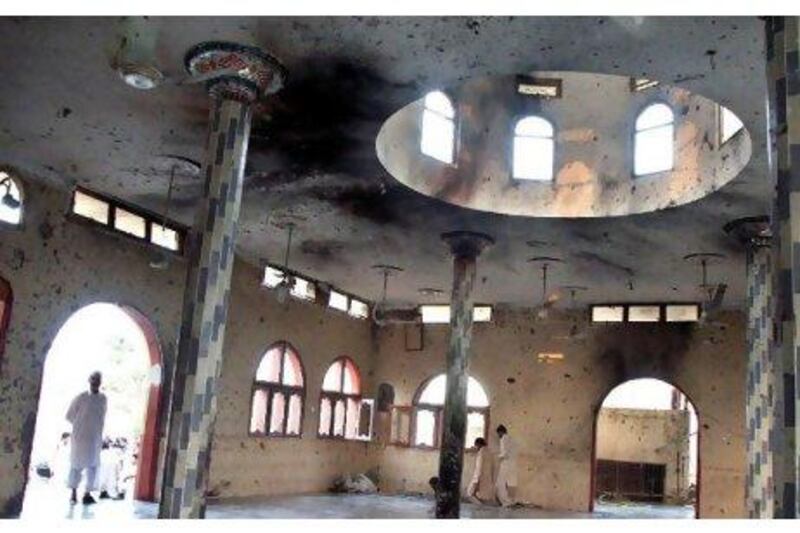ISLAMABAD // The death toll rose to 76 yesterday from Friday's mosque attacks in north-west Pakistan, assaults analysts say underscore the "seesaw" battle being waged between security forces and Islamist militants.
Five people died yesterday from wounds they sustained in a suicide bombing during Friday prayers at a mosque in Akharwal, raising the toll to 71. Following that bombing, a grenade attack hours later on another mosque in the country's Khyber Pakhtunkhwa province killed five more worshippers.
The senior provincial minister Bashir Bilour visited Budbher, seven kilometres from the provincial capital Peshawar, where unidentified men had hurled four grenades during evening prayers.
Funeral services were held yesterday at Akharwal in Darra Adam Khel, the site of the suicide attack.
Shahid Ullah Khan, the top government official of the district, visited the area yesterday to console the victims' families.
"The militants are not worthy of being called humans. They are worse than animals," he said.
The attacks shattered a brief period of reprieve from terrorist strikes. The bombings were the deadliest since September when a suicide bomber attacked a rally of Shiites in Quetta.
Residents of Akharwal had raised a private militia against Taliban militants in Darra Adam Khel, which is known for its arms trading. The Taliban here are led by the notorious militant commander, Tariq Afridi. Government officials said the attack was aimed at Mr Afridi's opponents, who had sided with the government and supported a military operation aimed at clearing the area of militants and their sympathisers.
The attacks were condemned not only for their savagery but were also seen as a reminder that militants would target anyone who would dare defy them.
Omar R Quraishi, the op-ed editor of The Express Tribune, a Karachi based English daily, said the attacks were "revenge attacks that showed Taliban go after their enemies with vengeance".
The attack in Budbher also appeared to be retaliatory. A police operation in the neighbourhood had targeted the Taliban and houses of militants were burnt down - a tribal custom of punishment.
Some Pakistani officials and analysts characterised the attacks as part of the wave of militancy in the country and not a spike spurred by revenge. "I think it is part of the continued militancy in the province," said Mehmood Shah, a retired brigadier and military analyst based in Peshawar. "But the militants are also suffering because the army operation has had effect. These people have been hit."
Mr Shah said Taliban militants belonging to Mr Afridi's group were driven out after recent military operations and hid in the neighbouring Orakzai tribal area.
"This is a group which is well known in the area but it has been sufficiently weakened. I think through the mosque bombing, Tariq Afridi is trying to re-establish his control," he said.
Mr Shah said he did not believe that militants were able to regroup and strengthen themselves in the Orakzai and Kurram tribal regions. "I don't think they have been strengthened in those two regions. But yes, they have not been routed either."
Kurram straddles the border with Afghanistan and is considered an important entry point into Afghanistan. The semi-autonomous tribal areas in Pakistan have long been considered safe havens for Taliban and al Qa'eda leadership.
The tribal areas also serve as the base for militants who have orchestrated suicide bombings inside Pakistan.
American officials have pressed Pakistan to launch a military operation in North Waziristan, a stronghold of militants who launch attacks on US and Nato troops in Afghanistan. Pakistan has resisted the pressure so far, saying it would decide on an appropriate time.
Mr Quraishi, the newspaper editor, said such incidents of terrorism would continue to wreak havoc in the country till there are no safe havens available to militants.
Mr Shah offered a grim prediction for coming weeks and months.
"This seesaw will continue for sometime. The militants are weakened but still capable."






